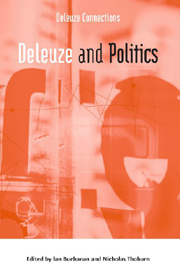Book contents
- Frontmatter
- Contents
- Dedication
- Acknowledgements
- Introduction: Deleuze and Politics
- 1 Power, Theory and Praxis
- 2 Deleuze and the Political Ontology of ‘The Friend’ (philos)
- 3 Molecular Revolutions: The Paradox of Politics in the Work of Gilles Deleuze
- 4 Schizoanalysis, Nomadology, Fascism
- 5 What is a Militant?
- 6 Bourgeois Thermodynamics
- 7 The Age of Cynicism: Deleuze and Guattari on the Production of Subjectivity in Capitalism
- 8 Deleuze, Materialism and Politics
- 9 Becoming-Democratic
- 10 Theorising European Ethnic Politics with Deleuze and Guattari
- 11 People and Fabulation
- 12 Micropolitical Associations
- Notes on Contributors
- Index
3 - Molecular Revolutions: The Paradox of Politics in the Work of Gilles Deleuze
Published online by Cambridge University Press: 12 September 2012
- Frontmatter
- Contents
- Dedication
- Acknowledgements
- Introduction: Deleuze and Politics
- 1 Power, Theory and Praxis
- 2 Deleuze and the Political Ontology of ‘The Friend’ (philos)
- 3 Molecular Revolutions: The Paradox of Politics in the Work of Gilles Deleuze
- 4 Schizoanalysis, Nomadology, Fascism
- 5 What is a Militant?
- 6 Bourgeois Thermodynamics
- 7 The Age of Cynicism: Deleuze and Guattari on the Production of Subjectivity in Capitalism
- 8 Deleuze, Materialism and Politics
- 9 Becoming-Democratic
- 10 Theorising European Ethnic Politics with Deleuze and Guattari
- 11 People and Fabulation
- 12 Micropolitical Associations
- Notes on Contributors
- Index
Summary
The current interest in the actuality of, or potential for, a Deleuzian politics might seem surprising. Firstly, because this politics, if indeed it exists, can only really be rooted in an era that has passed, namely May 1968 and its aftermath. Secondly, because, at the same time that it carries out a displacement and a redeployment of what had gone before, a Deleuzian conception of politics seems in many ways to consist of a conscious retreat. That is to say, it is founded above all on the recognition of a defeat and a rejection of the general model, which Deleuze feels to be outmoded, of intellectual engagement and political militancy. The term ‘politics’ itself becomes ambiguous: it signifies at one and the same time the resonance in Deleuze's work of the exceptional political and social mobilisation that was May 1968, which was a key event for an entire generation, as well as its theoretical reworking within an original and powerful mode of thinking. This mode of thinking refuses to be a straightforward commentary on May 1968, exploring instead its potential renewal, while taking the recognition of decline as a starting point. In this way, Deleuze's reflections on politics seem both to acknowledge, from a particular perspective, a historical period that has passed, and also to trace future ‘lines of flight’, without for all that the emergence of a clear perspective or alternative.
- Type
- Chapter
- Information
- Deleuze and Politics , pp. 54 - 73Publisher: Edinburgh University PressPrint publication year: 2008

